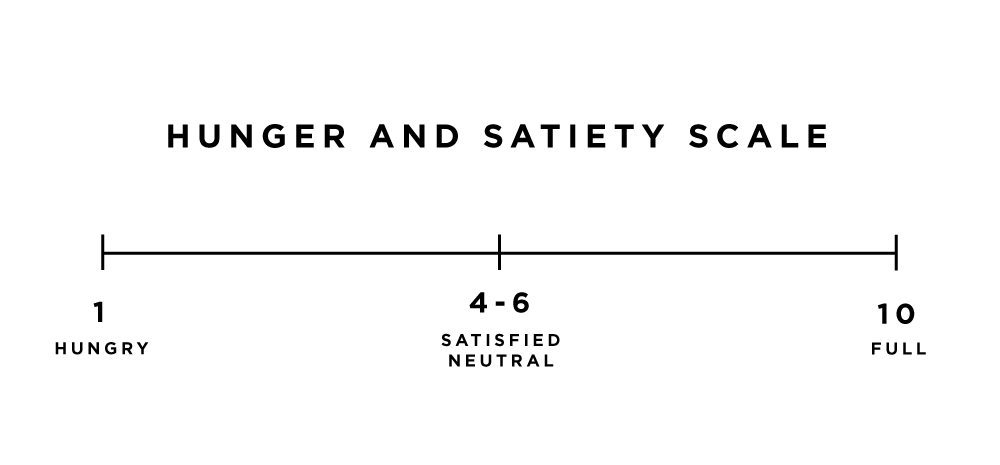It’s 2 p.m. You were supposed to eat lunch an hour ago, and now you want to eat anything in sight and potentially harm anyone who stands in your way.
This picture is unfortunately all too familiar for most of us. The end is usually not pretty in the sense that we’ll end up with poor nutrition choices and eat to the point of feeling sick. We all tend to assume this is just how life goes, rather than acknowledging this is actually a lack of understanding our own hunger and satiety cues.
If you haven’t heard of those terms before, don’t worry — you aren’t alone. Hunger is defined as the uncomfortable feeling in your stomach that is caused by the need for food. This is not to be confused with appetite, a desire for food. Your appetite often is not an indicator of what your body actually needs, but what your eyes are saying you need. Super frustrating.
After eating and sustaining that hunger when you become full, that is the process of becoming satiated. Satiety reflects you being full. How many of us actually know what that feels like? I would guess not many. A majority of us eat until we reach the point of feeling sick or of needing to lie down. This is not listening to your body and understanding your cues of when you’ve had enough food; it’s allowing your eyes and appetite to drive your choices.
So, with that said, how do we begin to understand our hunger and satiety cues?
We want to strive to always remain around that 4-6 range on the hunger and satiety scale. Never getting to 0, AKA “hangry,” or 10, AKA ‘Thanksgiving/Christmas day full.” When you start to have a feeling of hunger, address it. Either drink some water or have a little snack. You never want to ignore it and try to push through to the next meal. If you do that, your next meal is more likely to be overeaten because you are trying to compensate for how hungry you felt. This is the first of many tips to begin listening and understanding your hunger and satiety cues.
Here are a few more:
Put down your fork.
Take breaks between your bites. This will allow you to enjoy the food you are eating. This also helps you to slow down while eating a meal.
Eat slowly.
A meal should be at least 20 minutes long. This is because it takes that long for your stomach and hormones to tell your brain that you’re full. If you eat quickly, then your body won’t have time to tell yourself that you’re full, and will increase the chance of overeating.
Avoid getting seconds.
When you allow yourself to eat slower, you are more apt to feel full with what is on your plate. Unless you are still physically hungry, avoid getting second helpings. Also, if you are at a restaurant, try to leave some food on your plate. More often than not restaurants serve much larger portions than your body needs.
Remove food from vision.
Whether you want to take a few more bites from your plate, eat goodies at the office or at home, the temptation to overeat is always present when your eyes can see something. If you remove food from your eyesight, you won’t be tempted as easily, giving you time to decide if you are full, if you are at a meal, or if you actually aren’t hungry. Note: This shouldn’t be a tool used to restrict your food intake. Your body needs to be getting all of the essential nutrients. When you choose foods that are higher in fiber, vitamins and minerals you’ll feel more full throughout the day. This will help with not allowing yourself to eat when you aren’t hungry or eating a lot of those “less than optimal” choices.
These are just a few ways to challenge yourself to begin listening to your body. Our bodies are always trying to tell us when we are hungry or when we have had enough, we just have to slow down enough to listen!
How are you with knowing your body’s cues?
Image via Hart & Honey













1 comment
I love you distinguish between appetite and hunger Amanda. And the importance of paying attention internally. Such a useful skill.
I’ve found many of my clients don’t realize when their bodies (not just stomach) are hungry. This hunger can show up outside the stomach as migraines or fatigue or even low moods (given 90% of our serotonin is made in our guts!).
Is this what you’re referring to when you talk about appetite? Or is appetite what you think of as cravings associated with blood sugar imbalances and emotional eating?
I think all of us focused on food as medicine and health want to help people but we’re all using different terminology and sometimes leads to confusion. I’d love to learn how you see the differences!